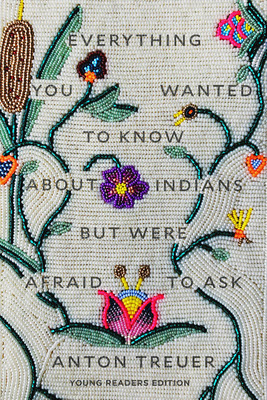I don't know about you, but I often feel awkward when I am around people from other cultures and ethnic groups. Why? Because I don't want to say something stupid or insensitive. I don't want to offend anyone without realizing that what I said was offensive. That is why this book, Everything You Wanted to Know About Indians But Were Afraid to Ask (Young Reader's Edition) by Anton Treuer, is so brilliant. The book is designed to answer those "out there" questions and presented in a format where the information is easy to find.
Dr. Anton Treuer is a professor of Ojibwe at Bemidji State University in Minnesota. His mother was an enrolled member of the White Earth Ojibwe Nation and he grew up in and around the Leech Lake reservation in Minnesota. In addition to his teaching responsibilities he has authored nineteen books and is the publisher of Oshkaabewis Native Journal, the only academic journal in Anishinaabemowin, the Ojibwe language. The adult version of this book was published in 2012 answering questions that came up during Treuer's many public lectures on Native culture. The Young Reader's Edition, the book I am reviewing, is an expansion of the original book and written with a YA audience in mind, though it is certainly an excellent resource for all ages of readers. This edition expands the question section, includes 50 more photos and illustration, and includes material on social activism, which the original didn't.
The book is organized into themed chapters: "Terminology", "History", "Religion, Culture, Identity", "Powwow", "Languages", "Politics", etc. Within each of these chapters Treuer answers several specific questions on the topic such as "What is allotment?", "How has tribal enrollment affected you personally?" and "Can non-Native people dance at powwow?" The book is designed with an extensive table of contents so that a reader can look for their specific questions and then page to the answer. Treuer makes it clear that he does not speak for all Native people but he does try to give examples from different tribes and Native people all around the US and Canada, sometimes even using examples from Native Hawaiians.
What I liked about the book:
- The book is long yet readable. The question/answer format makes the information very accessible.
- I liked the tone that Dr. Treuer used in his writing. It held authority but didn't talk down to the readers. I think the tone helps lessen the likelihood that a reader would end up feeling defensive if the answer contains some negative information about our history.
- There is an extensive table of contents to assist easy access to finding specific answers.
- Reference materials at the back of the book include suggested books for further reading, author;s notes, and a good index.
- The social activism section is up-to-date and answers questions about Native Activism that has been in the new lately which was one of my specific questions.
What I didn't like about the book:
- The specific questions within the table of contents are not indicated with a page number so the reader has to go to the particular chapter and search for the particular question/answer within the chapter themselves.
Every secondary and public library should have at least one copy, if not more, of this book. I give it really high marks.
By the way, regarding terminology, Treuer used the terms Native, Native American, Indigenous, and Indian in the book and they are all acceptable terms when addressing Indigenous people, or likely, at least, not likely to cause problems. He recommends, however, that we should use the terms each tribe uses for self-reference. For example, we can call Dakota people Dakota or Oneida people Oneida. But avoid using terms like 'Squaw' or 'Brave.' If you have a friend or a classmate, ask them by what term they like to be addressed.
-Anne


No comments:
Post a Comment
I look forward to your comments and interactions! Join in the conversation.